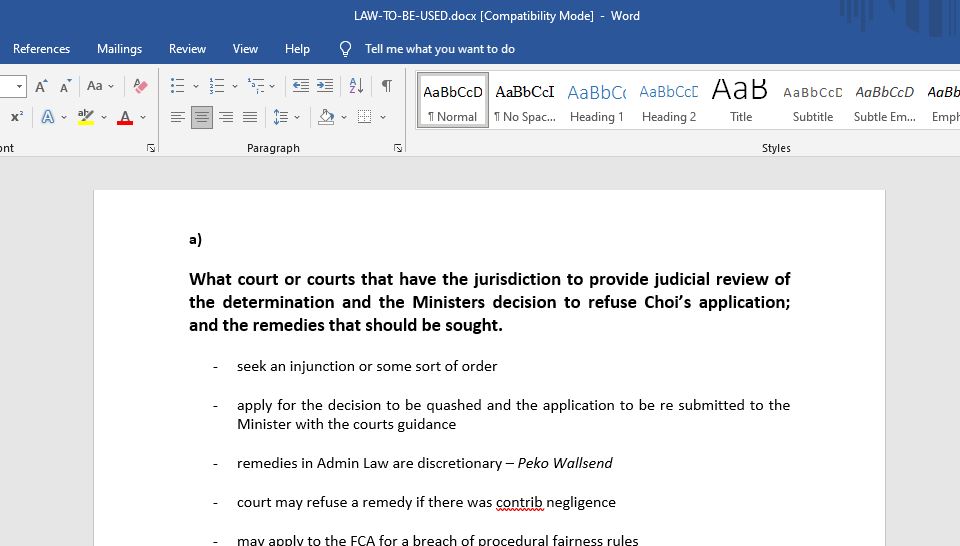Administrative Law Assignment
| Project Details | |||||
| Paper Topic | : | LAW400: Administrative Law | |||
| Style | : | AGLC | Language Style | : | English (U.K.) |
| Type of Assignment | : | ||||
| Acedemic Level | : | Graduate Level | |||
| Number of Sources | : | 1 | |||
| Order Instructions | |||||
| Please check and follow guidelines and requirements carefully | |||||
ADMINISTRATION LAW ASSIGNMENT 2016
Advise on each of the following;
a) What court or courts that have the jurisdiction to provide judicial review of the determination and the Ministers decision to refuse Choi’s application; and the remedies that should be sought.
- seek an injunction or some sort of order
- apply for the decision to be quashed and the application to be re submitted to the Minister with the courts guidance
- remedies in Admin Law are discretionary – Peko Wallsend
- court may refuse a remedy if there was contrib negligence
- may apply to the FCA for a breach of procedural fairness rules
Judicial Review of the Determination – decision of an legislative character
- breach of The Act s13
- Procedure not authorised by Statute
- ADJR Act – s5(1)(b) – Allows a decision to be challenged on the basis that procedures that were required by law to be observed in connection with the making of the decision were not observed.
- S5(1)(b) – that procedures that were required by law to be observed in connection with the making of the decision were not obs
- ADJR Act – s6(1)(b) – Allows a decision to be challenged on the basis of the conduct of the decision-maker leading up to the making of the decision.
- S6(1)(b) – that procedures that are required by law to be observed in respect of the conduct have not been, are not being, or are likely not to be, observed.
- Procedure not authorised by Common Law
- Validity of the decision – historically depended on whether the procedural step was ‘mandatory’ or ‘directory’
- Project Blue Sky v Australian Broadcasting Association (ABA) –
- Held: The better test in determining the issue of validity is to ask whether it was the purpose of the legislation that a decision made in breach of the requirement should be invalid. The purpose of the legislation can be determined by considering:
- The language of the relevant statutory provision
- The nature of the procedural requirement
- The subject matter of the decision
- The object of the statute
- The consequences for the parties if the decision is invalid
- Any public inconvenience result from a decision being invalid
- There was a failure by the ABA to comply with the Statute by treating New Zealand program/film makers less favourably than their Australia counterparts.
- Held: The better test in determining the issue of validity is to ask whether it was the purpose of the legislation that a decision made in breach of the requirement should be invalid. The purpose of the legislation can be determined by considering:
Ministers decision to Refuse Choi’s Application – decisions of an administrative character
- challenges to CTH administrators is through the FCA or Fed Circuit Court
- jurisdiction conferred by statute
- s75(5) of CTH Constitution provides the HCA original jurisdiction for proceedings in writs of Mandamus, prohibition or an injunction is sort against an officer of the CTH
- Mandamus & prohibition are common law remedies
- Mandamus compels officials to do their duty
- Cetiorari covers jurisdictional & non jurisdictional errors
ADJR Act confers jurisdiction to the FCA to hear matters in relation to Admin Law.
ADJR Act allows to challenge decision of an administrative character
if you go with an ADJR application you receive a s13 ADJR Act statement of reasons
Is the matter justiciable under the ADJR Act?
- The applicant must establish that there is a
- Decision or conduct for the purpose of making a decision
- S5(1) or s6
- Decision and Conduct per – s3(2) & s3(5)
- Administrative Character
- S3(1)
- S5(1) or s6
- Decision or conduct for the purpose of making a decision
- Made under an enactment
- S3(1)
- About a person aggrieved
- S3(4) – A persons whose ‘interests are affected’
- Relevant ADJR Act Sections
- S5 ADJR Act –
- Allows a person to apply for an order of judicial review to the Federal Court or Federal Magistrates Court
- Decision – In Respect of ‘a decision to which this Act applies’
- S3(1) –
- A decision of ‘administrative character’
- Inferring any admin decision
- Made under ‘enactment’ – s(3)
- Not a decision by the Governor-General
- Not a decision specified by Schedule 1 of the ADJR Act
- A decision of ‘administrative character’
- S3(1) –
- Person Aggrieved – If the person is ‘aggrieved’ by that decision
- S6 ADJR Act –
- Allows the same Courts to hear an application made by a person aggrieved by conduct for the purpose of making a decision to which this Act applies.
- S7 ADJR Act –
- Allows the same Courts to hear an application made by a person aggreieved by a decision-makers failure to make a decision
- Common Law Considerations
- ABC v Bond
- Held:
- Reviewable Decision – A reviewable decision is one for which provision is made by or under a statute. That will generally, but not always, entail a decision which is final or operative and determinative – at least in a practical sense of the issue of fact falling for consideration.
- Decision is substantive – A decision is substantive in nature.
- Conduct is not substantive – It is procedural rather than reviewing the making of the final decision.
- Held:
- ABC v Bond
Answer preview:
Word: 1,700

